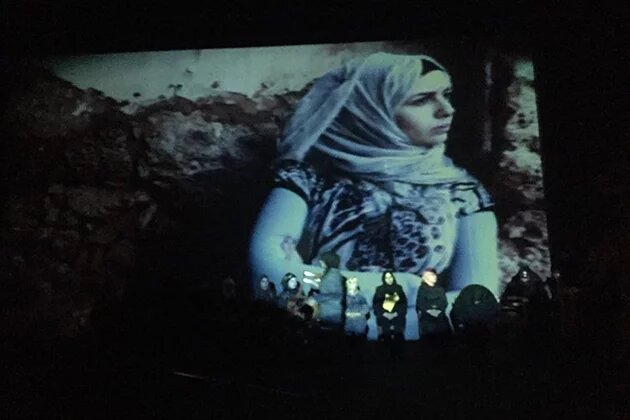
Through real-life testimonies and experiences, twenty-three Syria refugees recast the Greek tale of Antigone in Antigone of Syria, which will run from 10-12 December at the Al Madina Theatre in Hamra Street. The play is the product of an eight-week workshop during which the female refugees received acting and storytelling training to help them tell their stories. It is directed by Omar Abu Saada and produced by Aperta Productions.
The production highlights many similarities between the Greek Antigone, fashioned from Greek mythology some twenty-six centuries ago, and present-day Syrian and Syrian-Palestinian women. In times of war the focus nearly always falls on men and combatants and the stories of women are neglected and forgotten. But Antigone’s tale casts a spotlight on the suffering of women as a result of war. Just as the Greek lost her two brothers, so many Syrian women have lost their male relatives; just as Antigone fights for her right to bury her brother, so many Syrian women have fought to defend their families.
One of the show’s producers, Hal Scardino, told Al Modon: “We see a vast amount of news coming out of Syria, but women are absent from coverage of this conflict, and so we sought to give a voice to these women refugees through our play.” As for the symbolism of Antigone, she represents woman’s historical struggle against war, as playwright Mohamad Al Attar explains: “Antigone was the first play to give women space enough to voice the hardships they experienced through conflict and battle. It is a rewriting of history, which is only ever told from the point of view of men.”
The women involved in the play come from the refugee camps of Sabra, Chatila and Bourj El Barajneh and their ages range from sixteen to fifty-six. All are working women or housewives with no previous acting experience, creating what Scardino calls, “organic theatre”. According to Scardino the production team did not select the women based on casting sessions, but instead was assisted by a Lebanese charitable organization that put them in touch with forty women, all of whom were chosen. The number dropped to twenty-three, however, after some of the participants were forced to leave, either because their husbands objected or because they were reluctant to leave their children behind to attend daily rehearsals—even though the organizers set up a crèche for children of the performers.
The story of Antigone is the frame on which the play is hung, though this text—written by Mohamad Al Attar—is made up of the personal stories of the women involved. In place of the collective narrative of war, this play sheds light individual experiences. Attar explains that the decision to make the women participants in shaping the text was “to give them space to talk about their true memories, about their own private points of view as unique individuals.” According to Attar, their testimonies revolve around “the burdens and taboos that confront us” and in Scardino’s words are, “as much Lebanese as they are Syrian: stories about the Syrian war and exile and the consequent exposure to Lebanese racism.”
Noticeably, all the women wear the hijab, a relatively unusual sight on the stage. “At first it wasn’t easy to make them comfortable expressing themselves with their bodies and in words,” says Scardino, “quite aside from the fact that the idea of stepping onto the stage was terrifying to women who hadn’t set foot outside their homes for a year for fear of other people.” Sixteen-year-old Israa is the youngest participant. She never dreamed that, “a woman in hijab could get up onstage,” and was frightened by “the director, the cameras and all the rehearsing.”
To Attar, “these women are courageous for speaking about their daily struggle.” Their daily attendance at the workshops training sessions was at times a struggle in itself. Some had to lie to their husbands about where they were going every day or about the nature of the workshop. Twenty-nine-year-old Ward’s initial excuse for leaving behind her five children and other responsibilities was that she was attending a “sewing workshop”, but she eventually told her husband the truth after testing the water with him. Now, Ward has the full backing of her husband and children, “who help me memorize my lines”.
But the finished show is not the project’s only objective. “In a production like this,” says Scardino, “the process is more important than the performance.” The project is aimed at the participants themselves as much as it is to the audience. For these women it is an educational experience. Tangible evidence of this is Fatima, an illiterate woman who learned to read and write, helped by her fellow performers, as she memorized her lines. “Our tools and our goals are theatre, but this does not prevent there being other objectives as well, and this is what makes this kind of theatre so exciting, particularly because it produces results.”
The play touches on many aspects of the suffering of women refugees, but never depicts them as victims. Instead, as Attar puts it, “the play sets women in opposition to a dual authority—political and patriarchal—and this is an ideal framework to encourage the women to tell their stories.”
---
The article was first published in Arabic in Al Modon website on November 25, 2014
Translated from Arabic by Robin Moger